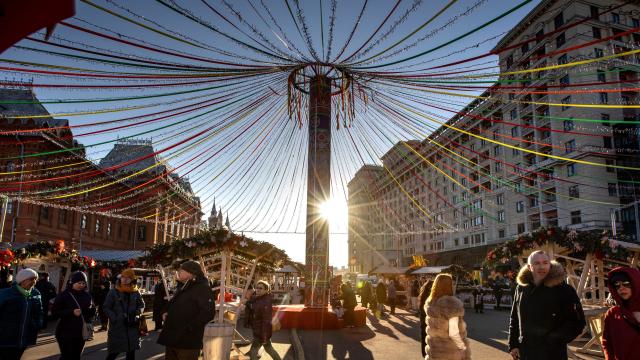Russia holds a place in our cultural imagination as being cold as balls. But with climate change, past results don’t guarantee future performance. Or even present performance for that matter.
Moscow just had its first winter in recorded history with average temperatures above freezing, running a blistering 6.3 degrees Celsius above average. The heat wasn’t isolated either, with other parts of Eurasia all experiencing freakish warmth and low snowpack.
We live in an era when it feels like new heat records are set on the regular, but this one in Moscow feels particularly jarring. Normally a bastion of cold, this Moscow winter—which, in meteorological terms, runs from December through February—was on another level. The previous hottest winter occurred in 1961, according to data gathered by Meteo France meteorologist and global record tracker Etienne Kapikian. That winter, temperatures rose 3 degrees Celsius above normal.
The temperature anomaly this winter effectively doubles the old one, making this a no-doubter for the record books, which stretch back 140 years, according to Russian news agency TASS. Both December and January were the warmest ever recorded. Snow has also been MIA, forcing the Russian capital to truck in a few piles for New Year’s Eve celebrations.
“What we have had this winter, you can’t call winter,” Tatiana Pozdnyakova, the Moscow Meteo-Office’s chief specialist, told state-run outlet RIA Novosti per an ABC report. “Because the temperatures for the whole season have been almost all … plus or just below zero. We don’t know—has winter started or have we jumped straight from autumn to spring?”
Other parts of Russia have also sizzled (relatively speaking) this winter, and it’s quite possible this will go down as the warmest winter ever recorded for the country, according to Capital Weather Gang. That includes an area of extreme heat over the Russian Arctic. Heat extended beyond Russia’s borders to Finland and parts of Europe, as well.
That includes Germany, which will mark its first year in history where ice wine makers won’t get a winter harvest due to abnormal warmth. The harvest normally takes place after temperatures dip minus-7 degrees Celsius (19.4 degrees Fahrenheit), allowing grapes to freeze and concentrate their flavour. That didn’t happen this year, though.
Rising temperatures associated with the climate crisis are one reason for the winter of discontent. All over the world, it’s becoming impossible to not tie abnormal warmth to carbon pollution, which has made heat records more likely and intense. It’s why Siberia could be luxury real estate by 2100. But natural climate patterns also play a role in shuttling heat around the world, and a hot Russian winter is no exception.
“The most direct answer to why Moscow was so incredibly warm this winter is that low pressure parked itself to the northwest of Moscow that kept them in a persistent west/southwesterly flow of air for all three winter months,” Judan Cohen, an atmospheric scientist at Atmospheric and Environmental Research, a Verisk Company, told Gizmodo in an email.
Those winds ushered warm air over Moscow and the surrounding area. That setup was in part influenced by the Arctic Oscillation, which has been cranking in a positive phase for most of this winter (and particularly over the last month). That’s characterised by high pressure camping over the central North Atlantic and strong air circulation around the Arctic. The more intense winds whipping around the Arctic essentially trap the coldest air over the region, while allowing warmer air to circulate around the midlatitudes.
The setup is the opposite of what we’ve seen in recent winters, when the Arctic Oscillation trended negative, allowing lobes of the polar vortex to dip out of the Arctic and into the mid-latitudes for days and weeks at a time. This winter’s largely positive Arctic Oscillation has helped bottle up cold to the far north and allowed warmer-than-normal conditions to prevail in Eurasia and even parts of North America. The U.S. has had a mild winter from coast to coast—and in the case of the Southeast, spring got its earliest start ever recorded.
